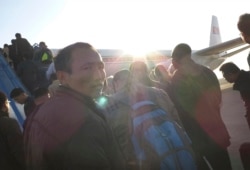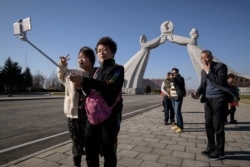North Korea has temporarily banned foreign tourists in response to the outbreak of a dangerous new virus in neighboring China. Depending on how long the ban lasts, it could hurt North Korea’s economy, which though heavily sanctioned, has received a boost by a recent influx of Chinese tourists.
Starting Wednesday, North Korea closed its borders to foreign tourists, according to Young Pioneer Tours, a China-based company that leads trips to North Korea. On its website, the company says it is not clear how long the suspension will last, but that authorities say they intend to reopen the border as soon as they institute precautionary measures.
The pneumonialike respiratory illness, which can be transmitted among humans, originated in the central Chinese city of Wuhan. It has infected more than 500 people, 17 of whom have died. Cases have been reported in countries including South Korea, Japan, the United States, and Thailand.
Willing to close border
It is not the first time North Korea has banned visitors in response to international outbreaks of infectious diseases. In 2014, the country shut its borders for four months during the Ebola outbreak, even though the disease never reached Asia. North Korea also restricted some visitors during the SARS epidemic in 2003.
“North Korea is probably more willing to shut down exit and entry than any other country,” said Andray Abrahamian, who specializes in North Korea at the George Mason University Korea.
But the move may be especially painful this time, Abrahamian said, since tourism is one of the only legal ways for the North Korean government to make money.
“(During previous outbreaks) they had a number of legal revenue streams that are now prohibited by sanctions. Tourism was small. Now, tourism is a much bigger industry and their last major nonsanctioned sector. So shutting down the border will have a relatively higher impact,” he said.
North Korea has been under United Nations sanctions since 2006, and unilateral U.S. sanctions for even longer, as a result of its nuclear and missile programs.
Need for tourism money grows
As the sanctions have expanded, North Korea has increasingly relied on the money brought by foreign tourists, almost all of whom come from China.
NK News, a North Korea-focused online publication, estimates that around 350,000 mainland Chinese tourists visited North Korea in 2019, providing about $175 million in extra revenue for Pyongyang.
North Korea is now in the middle of winter, typically off-peak season for foreign tours. But as the weather gets warmer, it may feel pressure to resume tourism as soon as possible.
“There will be a number of stakeholders hoping the Wuhan virus doesn’t spread in the coming weeks as the weather warms up and more tourists are expected,” Abrahamian said.
Rowan Beard, North Korea tours manager for Young Pioneer Tours, tells VOA that his company has had to delay some tours, but says the move is understandable given North Korea’s proximity to the outbreak and its apparently limited capacity to deal with the disease.
“North Korea is very vulnerable due to its shared border with China, its largest trading partner,” said Kee Park, a faculty member at Harvard Medical School who also specializes in North Korea public health.
“They also understand that drastic action is needed to prevent the new virus from entering North Korea since their capacity to diagnose, treat and contain the virus is limited should an outbreak occur inside North Korea,” Park said.
Park, who frequently participates in medical exchange trips to North Korea, says humanitarian organizations “should send medical and isolation supplies immediately and the (U.N.) sanctions committee should be proactive and issue a special exemption.”
North Korea has not yet reported any cases of the coronavirus. The World Health Organization (WHO) is working with North Korean officials to prevent an outbreak, North Korea state media reported this week, according to NK News.






